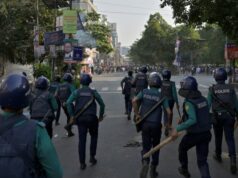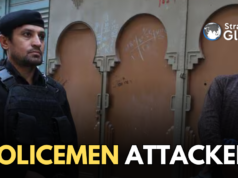“Pakistan and China are iron brothers.” It’s a line repeated so often in speeches and state media that it has become a cliché.
But at Sost, the last Pakistani settlement before the Karakoram Highway crosses into Xinjiang, the so-called “iron” looks brittle, if not corroded.
For weeks now, Chinese nationals have been stuck in this remote Gilgit–Baltistan town, stranded by Pakistani traders staging a blockade. Trade has stopped, tempers have flared, and for many Chinese, patience has snapped.
What’s striking is the silence in Beijing. A Baidu search for “Sost” brings up nothing from Chinese state media. Outside China, however, the story is hard to miss: Pakistani outlets like Dawn and several global platforms have covered the protests extensively.
The vacuum in official coverage has pushed the anger online. On Weibo and nationalist forums, Chinese users are not mincing words. They’ve revived the insult lü tou zang san (绿头脏三) literally “green head dirty third.” “Green head” riffs on Pakistan’s flag and on a Chinese slang for humiliation. “Dirty third” twists xiao san, a term for a mistress, mocking Pakistan as the needy “other woman” in this supposed all-weather romance.
🚨Just In 🇵🇰 :
Clashes between Chinese nationals and PaK Police reported in Sost border of Pakistan occupied Gilgit-Baltistan
Initial reports suggest Chinese national lashed on to Police over immigration issue
More details awaited pic.twitter.com/nDvdDpKzx5
— OsintTV 📺 (@OsintTV) September 10, 2025
Rocks on the Highway
On July 31, frustration boiled over. A video from Sost showed Chinese nationals themselves blocking the Karakoram Highway placing rocks on the road to stop Pakistani traders’ convoys. Immigration activities had already been suspended by the sit-in; the stranded travellers simply decided to return the favour. The footage went viral on Facebook, Instagram and YouTube. On Weibo? A trickle of discussion, and little more.

A week later, on August 6, a Weibo post bluntly accused Pakistan’s “iron brothers” of preventing Chinese citizens from going home. The comment section turned into a free-for-all of anti-Pakistan sentiment. “I don’t like Pakistani.” “For this Pakistani, one should use a wimp.” Others declared outright “hate.”

Fourth Week, Still Shut
By August 11, Dawn was reporting that the blockade had entered its fourth week. The Sost Dry Port was closed. Trade frozen. Travellers stranded. Chinese nationals remained stuck in limbo, caught between the protesters’ sit-in and stalled immigration procedures.
Then came September. On the 10th, Dawn again carried the story: hundreds of Chinese citizens, students and foreign tourists unable to cross at Khunjerab Pass for a second consecutive day. Many confronted local police, demanding action. Reports described shouting matches, angry complaints, and open confrontation with officials.
Brotherhood, Rewritten
What began as a traders’ protest has now spawned something deeper: a change in vocabulary. New slang, derogatory nicknames and sharp words that no official slogan can paper over. The border crisis has reminded many Chinese netizens that “all-weather friendship” is just rhetoric.
In Sost, the iron brotherhood looks less like steel and more like rusting scrap.

Research Associate at StratNewsGlobal, A keen observer of #China and Foreign Affairs. Writer, Weibo Trends, Analyst.
Twitter: @resham_sng





